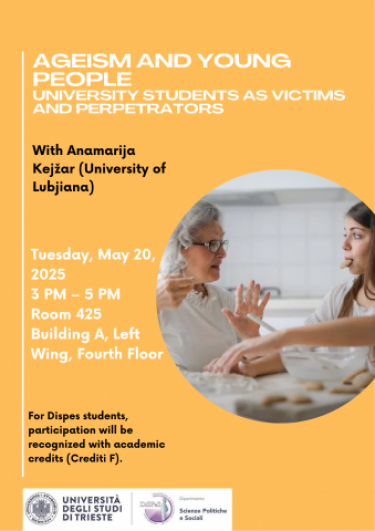- Home
- Dipartimento
- Ricerca
- Didattica
- Post Lauream
- Servizi e strumenti
- Trasferimento della conoscenza
Seminario "Ageism and Young people: University Students as Victims and Perpetrators"
Tipologia evento:
home
Sede:
Trieste
“Il seminario, tenuto da Annamarija Kejžar dell’Università di Lubiana, verterà sull’agismo esperito e riprodotto dagli studenti universitari. Al centro del seminario, quindi, vi saranno i pregiudizi legati all’età subiti dai giovani ed riprodotti da loro stessi verso i più anziani.
La relatrice, partendo dalla sua esperienza di ricerca, fornirà dati e riflessioni per esplorare questa specifica forma di discriminazione. La partecipazione all'evento verrà riconosciuta agli studenti del Dispes con Crediti F equivalenti alla sua durata".
Ageism and Young people: University Students as Victims and Perpetrators
The purpose of the seminar is to present different forms of ageism that can occur in various settings. Although ageism is typically understood as stereotypes and prejudice toward older people, the term itself refers more broadly to stereotypes and prejudice based on age. Research in Europe (including the fourth wave of the European Social Survey in 2008) has shown that more people experience age-based prejudice and discrimination than those based on gender, race, or ethnic origin. As the population continues to age, it is critical that negative and inaccurate beliefs and attitudes about the aging process are addressed and ultimately changed.
People may not always be aware that they are being ageist. Ageism can be either explicit or implicit, depending on a person’s level of consciousness or awareness of being ageist. In explicit ageism, a person’s ageist thoughts, feelings and actions towards others or themselves are conscious and intentional – that is, within their awareness and control. In implicit ageism, however, a person’s ageist thoughts, feelings and actions towards others or themselves operate without conscious awareness and are largely unintentional and beyond their control. In implicit ageism, individuals do not recognize the thoughts, feelings and actions that are triggered by age stereotypes, and they may rationalize such behaviour by attributing it to other factors (WHO, 2021). We live in a society in which gerontophobia (pathological fear or dislike of old people and ageism (prejudice or discrimination based on a person’s age; Butler, 1969). Research consistently shows that these two pillars of prejudice – fear of one's future and discrimination against older adults – are pervasive, difficult to change, and manifest in an “ideology of decline" that is instilled in us by culture. Identifying prevailing societal attitudes toward aging is critical because how older adults and the aging process are viewed impacts how older adults are treated and receive care (Guest et al., 2019).
A recent Slovenian study on ageism, conducted by the Center for Public Opinion Research in 2022, revealed that ageism in Slovenia is even more widespread than previously thought—every second person experiences it occasionally. In an ongoing study at the University of Ljubljana, we have found that students who have personally experienced some form of age discrimination (e.g., being told “You are too young to…”) tend to express stronger age-related biases. This highlights the importance of recognizing our own biases toward other generations when studying ageism or designing campaigns to reduce it – especially those aimed at challenging prejudice against older people. Across the European Union, different strategies are being implemented to address ageism, particularly toward older adults. This year, the World Health Organization relaunched an educational campaign to raise awareness about the various forms of ageism and the harmful consequences it can have on individuals.
The unacceptability and damaging effects of age-related prejudice toward older people are central themes of this seminar where we will present, research and discuss the stereotypes, forms and consequences of prejudices towards older adults. Our goal is to stimulate reflection on personal biases against older adults and to explore effective strategies for reducing age-related stereotypes.
Luogo:
 piazzale Europa n.1
piazzale Europa n.1
Edificio A
aula 425
Promotore:
prof. Francesco Miele
Ultimo aggiornamento: 12-05-2025 - 10:30



